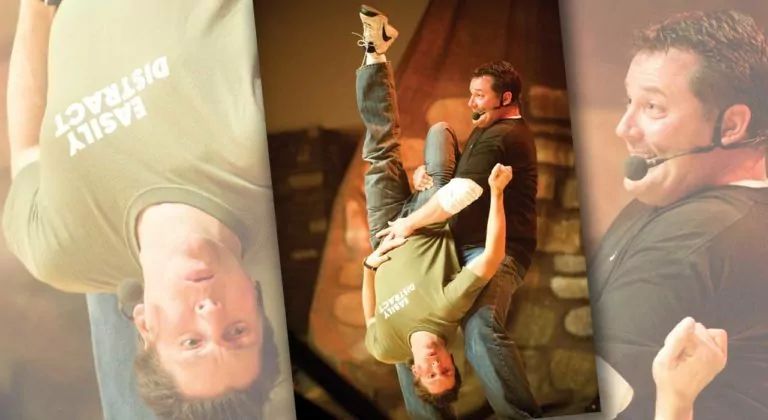An interview with the Panic Squad’s Andrew Bright (he’s the upside down one)
*****
Andrew Bright is a professional comedian and a professing Christian, and while that’s not as rare as the albino spotted zebra, comedic Christians are hard to come by. His improv comedy troupe, the Panic Squad (www.PanicSquad.com) is well-loved across the US and Canada, and known for their hilarious and clearly clean comedy. What follows is an edited version of our interview.
Did you always want to be a comedian?
While I loved making others laugh from a young age, I never imagined becoming a professional comedian. I guess it seemed so out of reach, something other people did. In junior high and high school I was searching for a way to fit in. I wasn’t super good looking or exceptionally smart, wasn’t athletic. But I was funny. I used humor as a way to be noticed and make friends, and defensively, as a way to deflect insults and mask the pain I experienced. I enjoyed the fact that I could always make my friends laugh, but never imagined a use for my wit and humor beyond just that.
When did you first try doing improvisational comedy?
The first time I saw improv comedy was at Trinity Western University (TWU) in BC. I was blown away. Here were guys and girls on stage getting suggestions from the audience, making up scenes and jokes off the top of their heads, and getting big laughs. It looked like so much fun, I wondered, “Can I could do that?”
When I tried out for TWU’s improv comedy league, “11:07” I discovered I had a real knack for improv comedy and was affecting others in a positive way. I had always loved acting, and making others laugh, and here was a venue created for just that. I thrived in this environment, the way anyone does when we discover God’s purpose for us. God wires us all differently, to be good at some things and not so good in others. It’s an amazing thing when we begin to operate in a role that fits with the unique way God created us.
How did you turn this into a full-time job?
Though improv comedy was a highlight of my years at TWU, I didn’t see it as a career option – it was my fun hobby. So along with some other TWU grads and students, we started putting the word out and would take anything we would get our hands on. If a youth group was willing to give us some gas money, we’d come and perform. We also began promoting some regular performances at a Christian coffee house in New Westminster, BC. Our first show had an audience numbering 6 people (and two of them were parents of a group member!). A humble beginning for sure! A few months later, however, we were breaking fire codes with over 500 people packing the place out.
While the Panic Squad was started as a hobby in 1996, God blessed our work and three of us quit our day jobs to make it a full-time career in 2001. At the time I had been married for just a year, and left a job in public relations in Bellingham, WA. That first year was very lean, my wife teaching second grade at a small Christian school and me trying to grow a career in comedy. It was an incredible year of fear, trust and surprises. At times it still doesn’t feel real. I just celebrated my 15th anniversary with my wonderful wife, have four amazing kids, and get to perform comedy across the United States and Canada for a living. We’ve learned some hard lessons along the way, been blessed with opportunities and shaken by disappointments, but it’s been a great journey. I feel like I am living Ephesians 3:20-21.
Someone watching one of your shows would see you guys are decidedly different. What makes your brand of comedy different, not only from the typical secular comedy, but even from most other Christian comedy?
We hope the first thing people notice when they watch our show is that we’re funny, real funny. As comedians, that’s our job and we take being funny seriously. The second thing you’ll notice is that our comedy is squeaky clean. Not clean by comparison to dirty comics, not clean enough for most venues, but simply clean. All the time, for any venue. That’s also very important to us. Clean is clean. You shouldn’t have to define or qualify it.
I think where excellence meets standards is what sets us apart. There are very funny, talented comedians who choose to perform material that is offensive. We’re out to prove that you can be committed to standards and still be successful. We perform clean comedy, and we put on a great show.
There are also comedians who market themselves as clean, or Christian, but they’re simply not funny. They have standards but no talent. Would you trust your home to a Christian electrician who knows nothing about electricity? Excellence gives you a credible platform. No matter your message, if your life or work is in opposition to what you’re saying, no one will listen. Our work is comedy, so we had better put on a funny show.
On your first DVD Your Title Here your teammate Cliff Prang talked about how performing your best requires a real unselfishness. He described improv as “setting each other up for success, working together, listening to each other, yielding to each other.” Improv sounds like quite the appropriate medium for Christians, one in which you serve one another in love (Gal. 5:13) to bring out the best in all of you. What else do you love about improv?
Improv is unlike stand-up comedy, or sketch comedy, where the audience sits and watches. With improv, the audience is a part of the show. It’s all about relationship. There is a genuineness or humanness to improv.
I love the fact that we can’t do this alone – we need the audience in order to do well. I love that I have no idea what will happen next in a scene. I love that there is grace in improv. There is transparency, for better or worse. The audience knows we are making it up as we go, and when something fails miserably, it can be just as funny, because it’s real. Improv is such an incredible metaphor of life. I think that’s one reason improv is so attractive to audiences.
It’s clear during the show that you really enjoy interacting with your audience. At the shows I’ve attended that interaction continues afterwards too – is that common?
It is. I think our off-stage personas set us apart from a lot of other acts. We have never been under that impression that we’re a big deal. I’ve never understood people who see themselves that way. Our identity is in Christ. He’s the big deal. We genuinely like people, too. We’re not the type of act that does the show and then disappears backstage until we can get to our hotel room. One of my favorite things is getting to know the people at our shows. Improv being so relationship-driven helps, too. At the end of a show you can’t help but feel like you know us, and we know you, a bit more. I love it when someone comes up and tells me, “I’m the one who shouted out, ‘radio-active chicken livers,’ when you asked for something you’d find in a high school lab.” Lets me know I’m hanging with my kind of people.
This article first appeared in the December 2014 issue.












